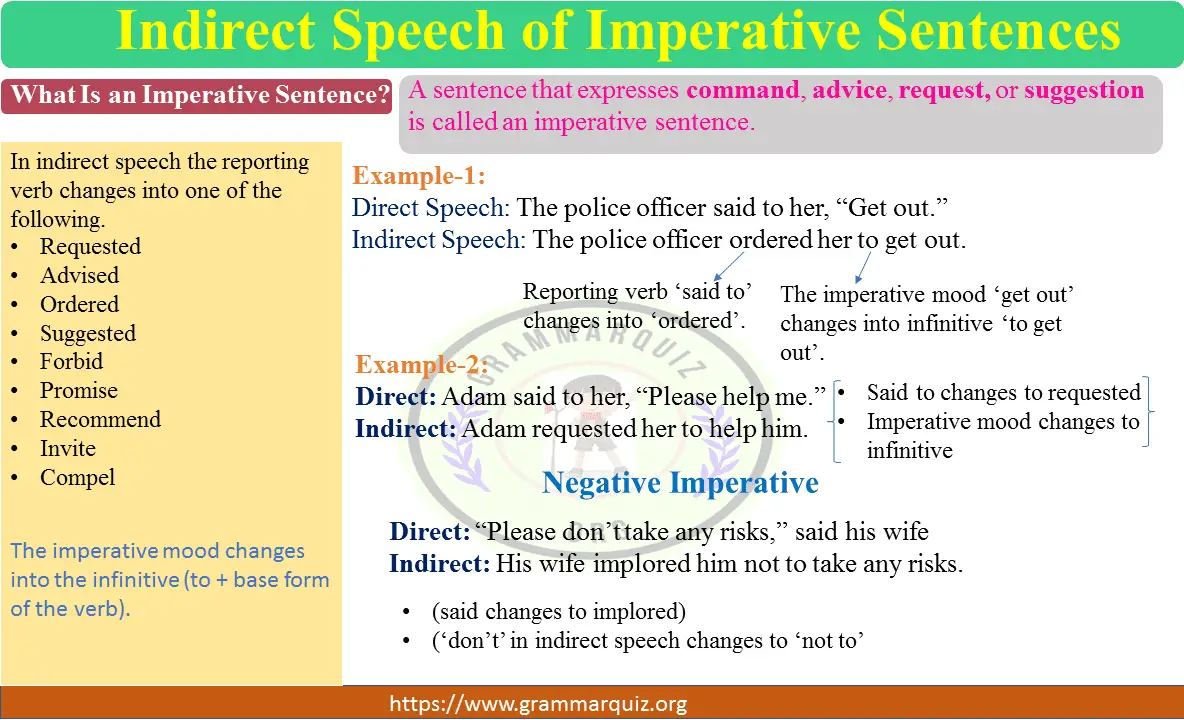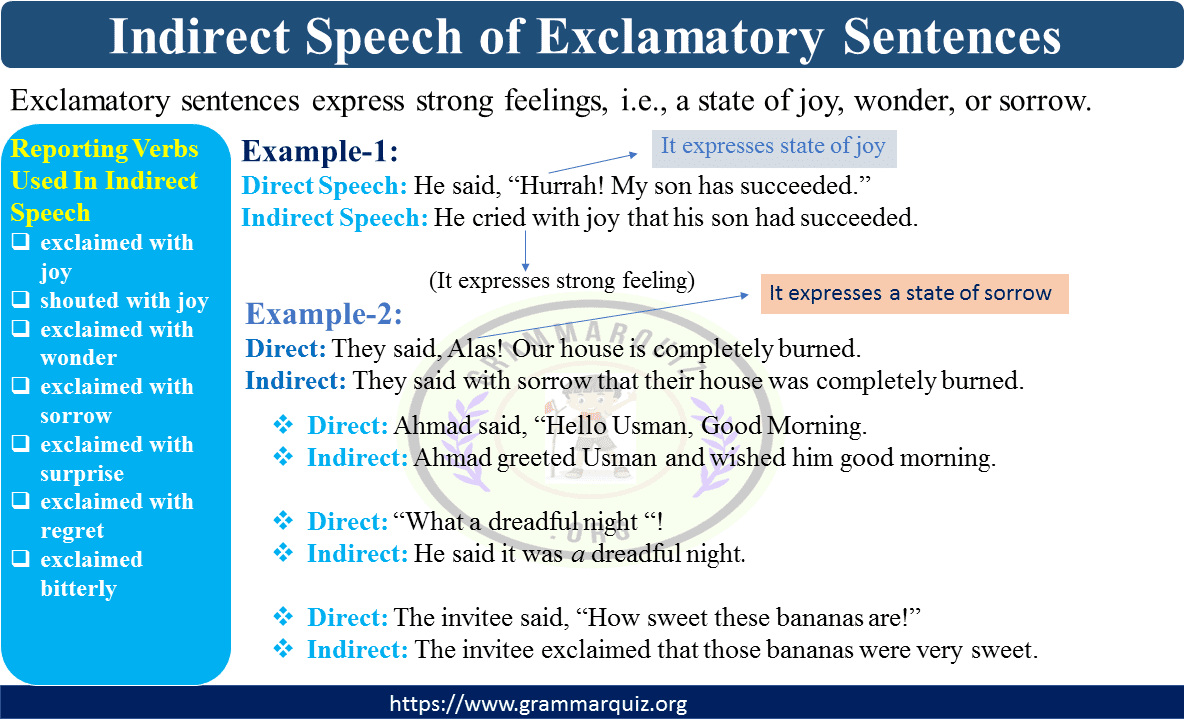Indirect Speech Imperative and Exclamatory Sentences Rules
Indirect Speech of Imperative Sentences
An imperative sentence is a sentence that expresses command, advice, request, or suggestion. To make the imperative sentence negative, don’t before the verb in direct speech and not to before the verb in reported speech, i.e., don’t go change to not to go in reported speech.
To convert such a sentence into indirect speech, both the reporting verb and the imperative mood are changed. The reporting verb changes into requested, advised, ordered, suggested, forbid, promise, recommend, invite, compel, etc., and the imperative mood into the infinitive, i.e. (to + base form of the verb).

Examples
| Direct Speech | Indirect Speech |
|---|---|
| The police officer said to her, “Get out.” | The police officer ordered her to get out. |
| “Call the First witness,” said the panel. | The panel commanded them to call the First witness. |
| She said to her students, “Ask me any question.” | She advised her students to ask her any questions. |
| Adam said to her, “Please help me.” | Adam requested her to help him. |
| I said to Ahmad, “You should take admission.” | I encourage Ahmad to take admission. |
| He said to him, “Go away.” | He ordered him to go away. |
| The girl said, “Thanks, I shall never forget this kindness, Aslam.” | The girl thanked Aslam and assured him that she would never forget his kindness. |
| Sara said to her teacher, “Please forgive me this time.” | Sara requested her teacher to forgive her that time. |
| “Take off your hats,” the officer said to the soldiers. | The officer ordered the soldiers to take off their hats. |
| Mother said to her children, “Wait here until I come.” | Mother asked her children to wait there until she came. |
| “Do sit down.’ said the villagers | The villagers invited me to sit down. |
Direct and Indirect Speech Negative Imperative Sentences Examples
| Direct Speech | Indirect Speech |
|---|---|
| Ali said to me, “Don’t waste time.” | Ali forbade me not to waste time. |
| “Please don’t take any risks,” said his wife | His wife implored him not to take any risks. |
| The pupils said to the teacher, “Don’t punish us.” | The pupils begged their teacher not to punish them. |
| “Don’t play out too far, boys,” mother said | Mother warned the boys not to play out too far. |
| Ali said to his brother, “Don’t disobey orders.” | Ali recommended his brother not to disobey orders. |
Indirect Speech of Exclamatory Sentences
A sentence that expresses strong feelings, i.e., a state of joy, wonder, or sorrow, is called an exclamatory sentence. Such intense feeling is represented by “Oh no “! and “Ugh “! etc.
Examples
- Ah! It is beautiful clothes.
- What a pretty girl she is!
- Alas! We have lost the match.
- What a mistake he has made!
- Ha! My phone was badly damaged.
To turn exclamatory sentences from direct to indirect speech. The words exclaimed with joy or shouted with joy, exclaimed with wonder, exclaimed with sorrow, exclaimed with surprise, exclaimed with regret, exclaimed bitterly, etc., are used in the reporting verb to express strong feeling. Exclamatory sentences become a statement in indirect speech.

Indirect Speech Exclamatory Sentences Examples
| Direct Speech | Indirect Speech |
|---|---|
| He said, “Hurrah! My son has succeeded.” | He cried with joy that his son had succeeded. |
| They said, Alas! Our house is completely burned. | They said with sorrow that their house was completely burned. |
| Salman said, “How intelligible I am! | Salman exclaimed that he was very intelligible. |
| He said, “Hurrah! I got the position in the school. | He exclaimed with joy that he had got the position in the school. |
| Julia said, “How stupid this boy is” | Julia exclaimed with wonder that the boy was very stupid. |
| The student said, “Hurrah! I have won the prize. | The student exclaimed with joy that he had won the prize. |
| Hina said, “Wow! What a lovely dress it is. | Hina exclaimed with wonder that it was a lovely dress. |
| Ahmad said, “Hello Usman, Good Morning. | Ahmad greeted Usman and wished him good morning. |
| “What a dreadful night “! | He said it was a dreadful night. |
| The invitee said, “How sweet these bananas are!” | The invitee exclaimed that those bananas were very sweet. |
| I said, “Alas! He has been ruined. | I exclaimed with great sorrow he had been ruined. |
| She said, “What a fool I have been!” | She exclaimed with regret that she had been a fool. |
Expression Reported in Statement Form
The following are some familiar expressions reported in statement form.
| Direct Speech | Indirect Speech |
|---|---|
| She said, “Thank you.” | She thanked me. |
| My roommate said, “Good morning.” | My roommate greeted me. |
| They said, “Congratulations.” | They Congratulated me. |
| She said, “Yes.” | She agreed with me. |
| He said,” You’re kidding.” | He didn’t believe me. |
| He said, “Really “? | He was surprised. |
| He said, “Ugh!” | He exclaimed with disgust. |
| She said, “Welcome!” | She welcomed us. |
Reported Speech of Sentences Start with “Let”
Sentences of let are mainly used to ask permission or give suggestions. If a sentence starts with let give a suggestion, we use propose, suggest or advised, etc., as a reporting verb and past participle after should in the second part of the reported speech.
If a sentence with let asks permission, we use requested as a reporting verb. In the second part of the reported speech, either use let after to, or use should + be after to with past participle of the verb.
Examples
| Direct Speech | Indirect Speech |
|---|---|
| She said, “Let me go.” | She requested to let her go. Or She requested that she should be allowed to go. |
| Ahmad said, “Naeem, Let’s start study.” | Ahmad suggested Naeem to start study. Or Ahmad said to Naeem that they should start study. |
| His brother said, “Let them play.” | His brother advised that they should be allowed to play. |
| The student said to the teacher, “Let me explain this to the class.” | The student requested the teacher to let him explain this to the class. |
| They said, “Let’s leave the books in the classroom.” | They suggested leaving the books in the classroom. Or They suggested that they/we should leave the books in the classroom. |